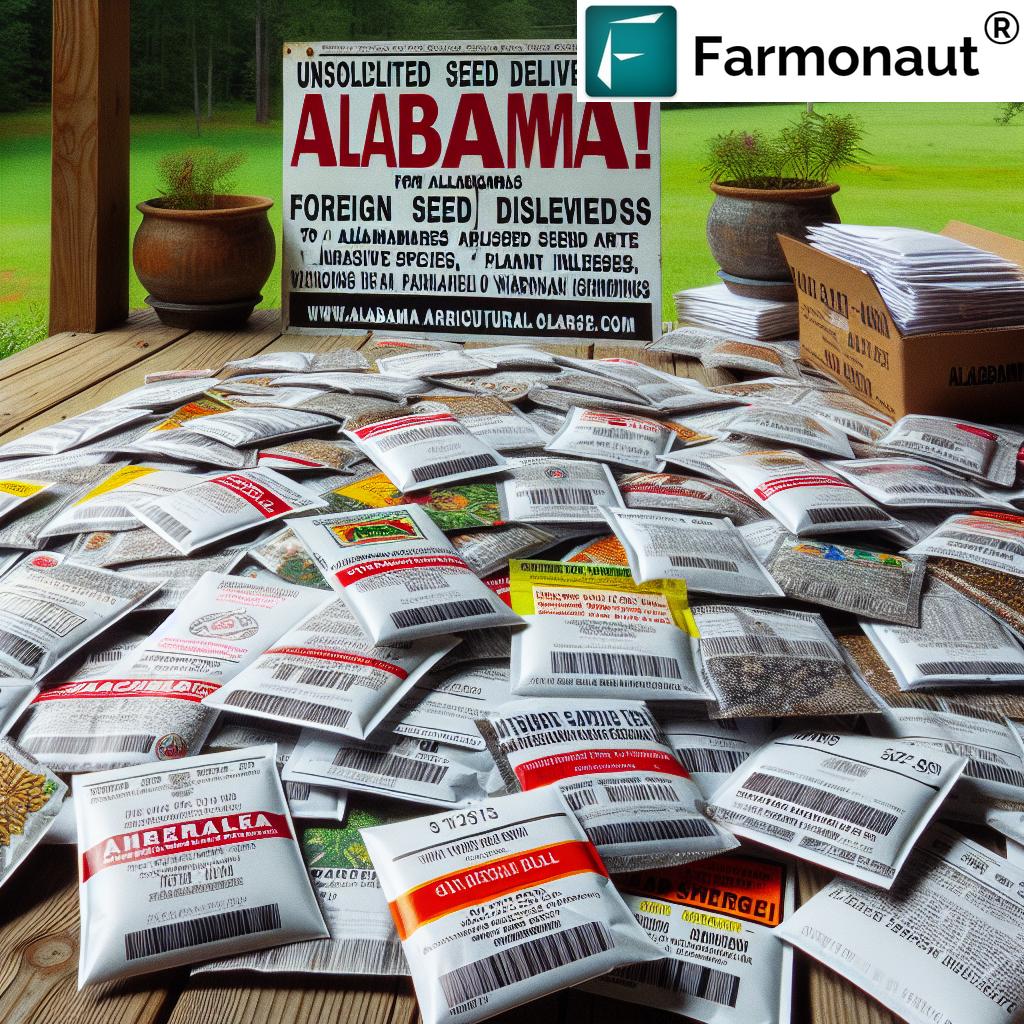Alabama Unsolicited Seed Packages: 7 Essential Safety Steps
The Emergence of Unsolicited Seed Packages in Alabama
In recent years, especially since 2020, the phenomenon of unsolicited seed packages Alabama has alarmed both authorities and residents statewide. These mysterious packages often arrive unexpectedly, catching recipients off guard.
Our community’s vigilance heightened as scores of reports emerged regarding the delivered seeds, mainly via the United States Postal Service. Often, these seed packets are labeled as ‘jewelry’ or ‘gifts,’ raising suspicions about their true origins and contents.
Upon receiving such packages, many found tomato and onion varieties identified as the primary contents. The Alabama Department of Agriculture and Industries (ADAI) has been proactive in investigating these deliveries, tested the items, and issued public advisories to ensure public safety.
The emergence of foreign seeds delivered to residents involves a complex interplay of global shipping, e-commerce loopholes, and, in some cases, intentional targeting. While not all seeds tested showed harmful compounds, the situation requires utmost caution due to potential threats to our local agricultural systems and the wider environment.
Why Are We Seeing These Unsolicited Seed Packages?
- Originating from foreign countries: Most of these mysterious seeds have been traced back to international sources, primarily from Asia, with packages originating in China and other countries.
- Potential brushing scams: Some experts suggest that the unsolicited delivery could be linked to e-commerce ‘brushing’ scams, where sellers send bogus items to boost online ratings.
- Regulatory loopholes: The global nature of online shopping and postal services creates opportunities for unlawful seed distribution Alabama to bypass local laws and checks.
The community must be aware of these shipments’ risks, as they could introduce invasive plant species in Alabama or even facilitate the spread of plant diseases from imported seeds.
Potential Risks: Invasive Species and Plant Diseases
Receiving unknown seeds is not merely an inconvenience, but a legitimate cause for agricultural concern. Even if a seed appears harmless or is a familiar variety, introducing it from an unknown or foreign source puts our ecosystems and crops at risk.
Invasive Plant Species in Alabama: What’s at Stake?
If foreign or unidentified seeds are introduced carelessly into our local environment, the risk of invasive species taking root rises dramatically. These species can outcompete native plants, disrupt local food webs, and devastate our natural landscapes.
- Kudzu: Once harmlessly introduced, now known as “the vine that ate the South,” overtaking native trees and landscapes.
- Cogongrass: Extremely flammable and aggressive, listed among the world’s worst invasive weeds, present risk to both crops and wildlands.
- Chinese privet: Crowds out native vegetation, alters soil composition, and contributes to habitat loss for local wildlife.
The Environmental and Economic Costs
Invasive species cost the United States over $120 billion annually, presenting a huge financial threat, particularly to states with robust agricultural economies like Alabama.
Plant Diseases from Imported Seeds: The Hidden Dangers
Pathogens can be transmitted via seeds, including:
- Fungi and Bacteria: Some diseases, like bacterial wilt and Fusarium wilt, can wipe out entire crops and persist in the soil for years, making them challenging to eradicate.
- Viruses: Viral pathogens spread by imported seeds could affect tomatoes, onions, and many other economically vital crops.
- Nematodes: Microscopic worms that cause root damage and reduce yields if introduced through contaminated seeds.
Experts, including those at the Alabama Cooperative Extension System, emphasize that even seeds tested and appearing harmless may still carry threats that are not immediately apparent. Planting these could unknowingly contribute to severe crop losses and long-term environmental change.
The bottom line: We must never order, plant, or share seeds from unknown or suspicious sources. Always be alert to the risks posed by unsolicited seed packages.
Legal Framework & Agricultural Regulations in Alabama
To protect Alabama’s agriculture, the state enforces specific agricultural regulations on the distribution and sale of seeds. Unsolicited foreign seed deliveries directly challenge this legal structure.
Alabama Seed Labeling Requirements & Testing
-
According to Alabama Code § 2-26-11, it is unlawful to sell, offer for sale, or distribute vegetable or agricultural seeds in Alabama unless they are
- Tested for germination rates and quality,
- Clearly labeled to advise buyers of type and origin,
- Free from excessive weed content, and
- Meet specific purity standards.
- The Alabama Administrative Code further details restrictions on seed mixtures and prohibits distribution of packets containing unauthenticated or substandard products.
Failure to comply with these regulations exposes the state to heightened risks, including invasive plant species infiltration and poorly controlled diseases. Proper labeling requirements and strict testing help us identify and block unlawful seed distribution Alabama.
Reporting Suspicious Seed Packages
The ADAI established dedicated channels for reporting suspicious seed packages. Residents are strongly advised to use the official online system, or contact their local Alabama Cooperative Extension office, upon receiving anything unusual.
Find the official reporting portal here:
Report Unsolicited Seed Packages (Alabama Department of Agriculture & Industries).
Key actions authorities and the extension system recommend include securely storing the package, not opening it, and following all official advice.
7 Essential Safety Steps: How to Handle Mystery Seed Packages in Alabama
Here, we detail the key measures every Alabama resident should follow upon receiving unsolicited seed packages, supporting both immediate safety and long-term environmental preservation.
- Do Not Open the Package: Avoid contact with unknown contents and potentially harmful compounds that might be inside.
- Do Not Plant the Seeds: Planting can introduce invasive species or disease pathogens into the environment.
- Do Not Dispose of Seeds in Trash or Compost: Standard disposal or composting risks contamination and unchecked sprouting.
- Report Receipt to State Authorities: Use the ADAI online reporting system or contact your local Extension office as soon as possible (Official Portal).
- Follow Guidance for Secure Storage: Place the package (untouched) in a safe, sealed location pending further analysis by authorities.
- Provide Full Details in Your Report: Include delivery date, packaging information, and any identifiers for accurate investigation.
- Cooperate on Follow-Up Actions: Await instructions for possible collection by officials or guidance on secure destruction if needed.
Illustrative Example: Why Each Step Matters
Ignoring these essential steps could contribute to the rapid spread of aggressive plants like cogongrass across local ecosystems, or foster long-term persistence of pathogens that could undermine decades of careful agricultural management in Alabama.
Protecting our agriculture requires both vigilance and cooperation between residents, officials, and the broader agricultural community.
Step-by-Step Response and Risk Assessment Table
How Farmonaut Supports Sustainable Agriculture in Alabama
To effectively confront the threats to Alabama agriculture, we need more than vigilance; we need technology-powered solutions that support biosecurity, crop health monitoring, and rapid response.
What Is Farmonaut?
Farmonaut is an innovative agricultural technology company offering robust, satellite-based farm management tools to both large agricultural businesses and individual farmers in Alabama and worldwide. Our platform is available as an Android app, iOS app, web/browser app, and API integration.
We address the challenges of invasive species and plant diseases through data-driven, affordable, and scalable technologies, empowering you to protect your crops and local ecosystems.
- Satellite-Based Crop Health Monitoring: Use satellite imagery for real-time assessment of your crop’s vitality, soil moisture, and stress levels—enabling early detection of abnormal patterns possibly linked to disease or invasive species.
- AI-based Jeevn Advisory: Receive timely advisory insights, weather alerts, and management tips delivered directly to your device (web/mobile) via Jeevn AI to boost productivity and reduce risks.
- Blockchain-Based Traceability: Companies and producers can ensure traceability from field to table, improving regulatory compliance, supply chain trust, and the ability to track the journey of any agricultural package or seed delivery.
- Carbon Footprinting for Sustainable Action: Calculate and monitor emissions through our carbon footprint tracking module — vital for regulatory compliance and ESG reporting and crucial for modern, responsible farm management.
- Fleet and Resource Management: Track vehicles and resources to optimize field logistics, ensure safety, and monitor all aspects of your large or multi-location farm operations efficiently through our dedicated modules.
- Large Scale Farm Management: Our Agro Admin App supports enterprise-level needs for crop, plantation, and forest management across hundreds or thousands of acres.
- Crop Loan & Insurance: With satellite-based verification for crop loans and insurance, providers and farmers reduce fraud risks and simplify approvals.
Integrate Farmonaut into your platforms with our flexible API. Full developer docs available here.
Affordable Farmonaut Subscriptions
Explore cost-effective precision farming solutions and unlock advanced features for monitoring and protecting your Alabama business or farm:
Frequently Asked Questions (FAQ) – Unsolicited Seed Packages in Alabama
What should I do if I receive an unsolicited seed package?
Do not open or plant the seeds. Store them securely, report to ADAI via the official portal, and await further instructions.
Why can’t I just throw the seeds away in the trash?
Disposal in normal trash or compost risks accidental introduction of invasive species or diseases if the seeds germinate or escape into the environment.
How do I report suspicious seed packages in Alabama?
Use the ADAI online reporting system or contact your local Alabama Cooperative Extension office.
Are seeds in mystery packages always harmful?
Not always, but seeds from unknown foreign sources may carry hidden pathogens, invasive plant species, or non-compliant varieties posing a legal and ecological risk.
Can Farmonaut help me detect invasive plant threats on my Alabama farm?
Yes, with satellite-based crop monitoring and AI advisory, Farmonaut can pinpoint abnormal growth or stress patterns that indicate possible outbreaks, allowing early response before threats escalate.
What are the key legal risks for planting or distributing foreign seeds in Alabama?
Under Alabama seed labeling requirements and agricultural regulations, unauthorized distribution, sale, or planting of foreign seeds could result in fines or legal action due to risk of invasive species introduction and disease transmission.
How quickly should I report a mystery package?
Immediately upon receipt. The faster you act, the better authorities can track sources and coordinate a rapid containment response.
Conclusion: Protecting Alabama’s Agriculture & Ecosystems
The rise in unsolicited seed packages Alabama presents real and evolving threats to Alabama agriculture, from invasive plants to new plant diseases. Protecting our local ecosystems is a shared responsibility.
Our collective response—rooted in reporting suspicious seed packages, never planting what we do not order, and working with authorities—is essential for a sustainable, secure agricultural future throughout Alabama.
With advanced solutions from Farmonaut, we can monitor our fields with unprecedented accuracy, safeguard supply chains, and uphold legal standards for every seed entering our state. Together, let’s ensure that the only plants thriving in Alabama are those we intentionally cultivate, preserve, and enjoy—free from unwanted threats.


















